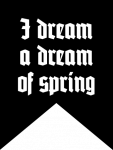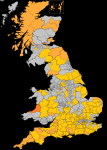The cold winter sun breathed a chill fog on John’s skin. A microphone had been thrust into his face. Despite the police that flanking him, some news crews wanted to be lucky. Downing Street was in pandemonium; Reporters and Journalists and Cabinet Ministers and Police flocked together in a single crowd as young party workers in Number Ten threw bunting and shredded paper over the seen. It was like snow, except, as John was sure, it was old Treasury reports.
“I have just met with the Queen-” John shouted over noise, “and I have accepted the invitation to form a Government. It is of course an honour and a privilege to serve one's country, and the responsibilities and challenges that await me will be great. But I will not shirk my responsibility, and I will stand to fight each challenge with the vigour and courage expected of me, and expected by those that elected the Conservative majority under my predecessor in June.”
A cheer swept the crowd, and John smiled. He continued, “And the challenges are great. We face an economy in recession, an education catastrophe, and a healthcare crisis. I am aware of the pain in the country. Despite what my title may suggest, I did not come from wealth. I came from poverty, born and raised in a slum house in Birmingham that the Housing Minister described as ‘unfit for human occupation’. I did not receive a higher education- indeed, I did not step foot into such a facility until I was invited to Aston University for a husting when I was the Prospective Parliamentary Candidate for Perry Barr. There is a lot of pain in the country, and I know this more than people assume. I may represent Aldershot, but I come from a city that the Labour Government left to rot. And it is this rot I seek to clean. In place of rot, this Government will bring growth. In place of poverty, may we bring prosperity. In place of fear, may we bring safety. In place of strife, security.”
The hand of a Policeman began to pull John towards the black portal of Number Ten.
“Prime Minister, what sort of administration will you lead? Will Miss Montgomery have a place in it? How long do you intend to stay?” A reporter called out as John moved to step through the door. Stopping, John turned to him.
“Well, I’m about to go into this house, and plan that administration. But it will be one of talent, of strength, and of wisdom. Miss Montgomery will have a role in this administration if she wishes to. And I intend to stay until my job is done and the country is working. So, I intend to stay for as long as possible.”
And with that, he turned and walked through the door. It swung shut behind him, and there was silence. The staff stood watching John, as if they were gazing at a rare bird. A stone found in his stomach, heaving down. A moment passed. Finally, out of the crowd of staring eyes the Prime Minister's Private Secretary emerged, walking across the checkered floor, clapping. The crowd behind him followed in applause, and with an outstretched hand Sir John Kay- The Prime Minister- went to greet them.








